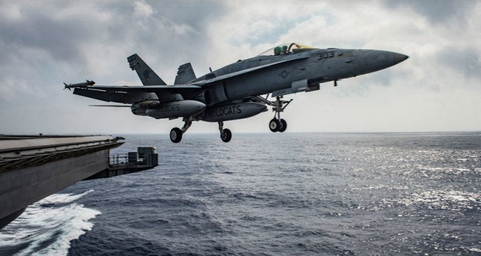According to Bangash, the governing body of Afghanistan is on the verge of breakdown, as a 2014 coalition, formed after US-brokered elections is about to crumble due to a bitter struggle between President Ashraf Ghani and Chief Executive Abdullah Abdullah.
“It is an American arrangement, resulting in that they created a donkey with two heads,” Bangash said of the US-brokered political climate in Afghanistan, in an interview with Loud & Clear. “You can’t have a donkey that has a head on its actual place, and a head on its tail place, and expect this animal to make progress.”
© AP Photo/ Mindaugas Kulbis
The swift and apparently successful 2001 US military invasion into the country is now stuck in a quagmire, Bangash said, offering that Washington disregarded two key problems.The first, and seemingly the most obvious, is that Afghans will never tolerate foreign occupation. In 2001, “the Taliban had no sufficient equipment like an air force to counter American intervention,” and they fled to countryside, creating the illusion of a US victory.
“[Afghans] will never accept foreign domination or occupation. If there are foreign fighters in the country, they will fight foreigners.”
The second issue is that Afghan society is “deeply divided,” appearing to be “a patchwork of tribes,” consisting of Pashtuns, Uzbeks and Hazara, among others. The “fact that tribes have to be accommodated in any political arrangement” makes it extremely difficult to form consensus.
A fragile balance of power was nearly brought into being in the country just before the 1978 coup. “The people [behind the coup] wanted to reform the country,” Bangash offered, but the culture is deeply conservative, and “when you try to impose [reforms], even if they are well-meaning, they are not going to succeed.”
© AFP 2016/ JAVED TANVEER
“The US got deeply involved there in 1979,” he said, suggesting that “The US wanted revenge on the USSR for America’s humiliation in Vietnam. And they thought, it’s a good opportunity to settle scores. But the price of course was paid by the Afghan people.”In 2001, Washington used a pretext of human rights abuse, particularly that against women, to invade, he suggested.
“Why are Americans there? Are they there because of women’s education or girls’ rights? It would make much more sense if Americans turned their attention to Saudi Arabia,” where women are much more oppressed than in Afghanistan, he opined.
After having poured over $2 trillion into an arduous Afghanistan campaign for the last 15 years, Washington has not seen an improvement in the quality of life in the country, primarily because that was not the true objective of the US invasion.
“The root of the problem is that Afghanistan is extremely rich in natural resources,” Bangash said, adding, “There are estimates that say that the country contains $4 trillion worth of natural resources. The country is also very rich in cadmium, a metal that is widely used in modern technology like cellphones. That is really driving American policy.”
The constant military invasions and world policing by the US are driven by a military industrial complex that cannot leave any profitable stone unturned, he said, adding that corporate greed, whether in the hands of a weapons supplier or a commodities broker, will prevent any resolution of the crises.
“I do not see any American leader willing to withdraw from Afghanistan,” despite the loss of US lives, he said.

 IG Jafar is seen with tears down his face in the armoured vehicle
IG Jafar is seen with tears down his face in the armoured vehicle IG Jafar is seen struggling to deal with the daunting task ahead
IG Jafar is seen struggling to deal with the daunting task ahead IG Jafar is hugged by his family and other jihadis before setting off
IG Jafar is hugged by his family and other jihadis before setting off IG Jafar points his finger up in support of Allah
IG Jafar points his finger up in support of Allah IG The smoke after the suicide mission
IG The smoke after the suicide mission





